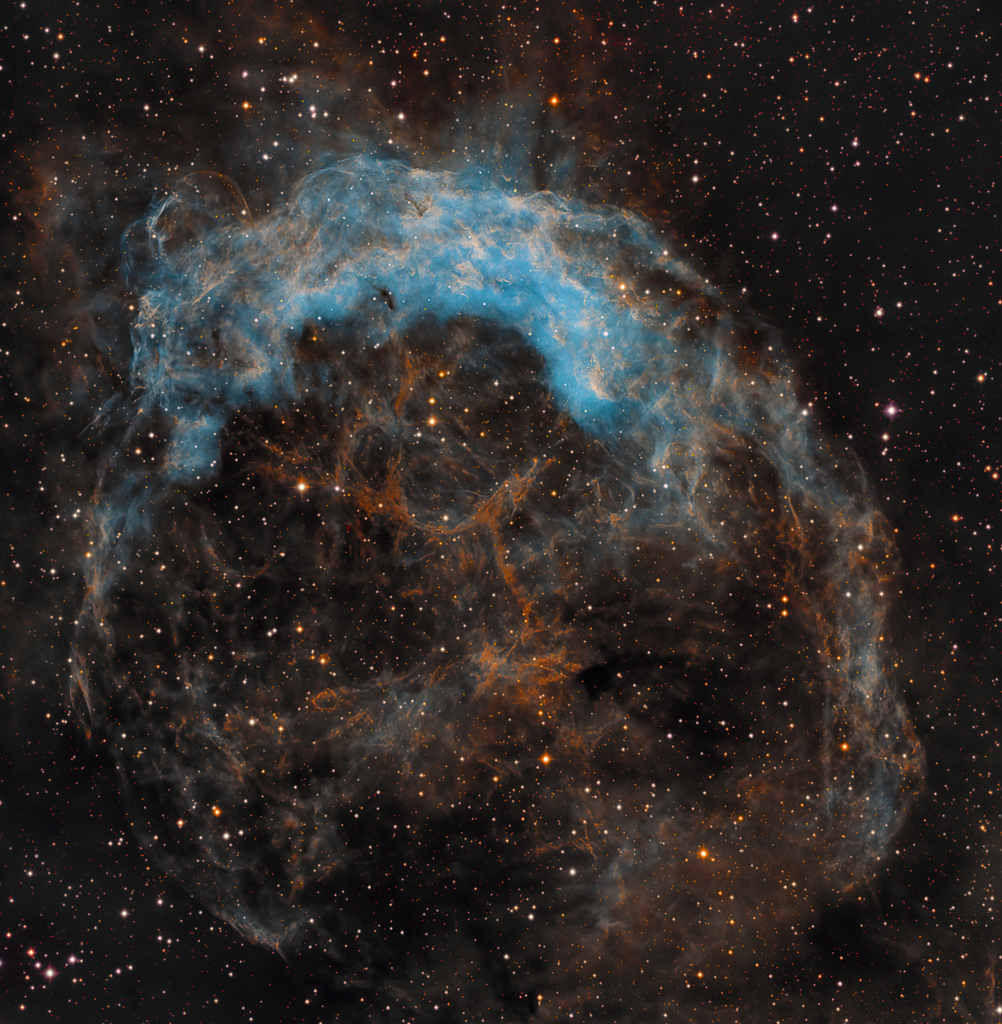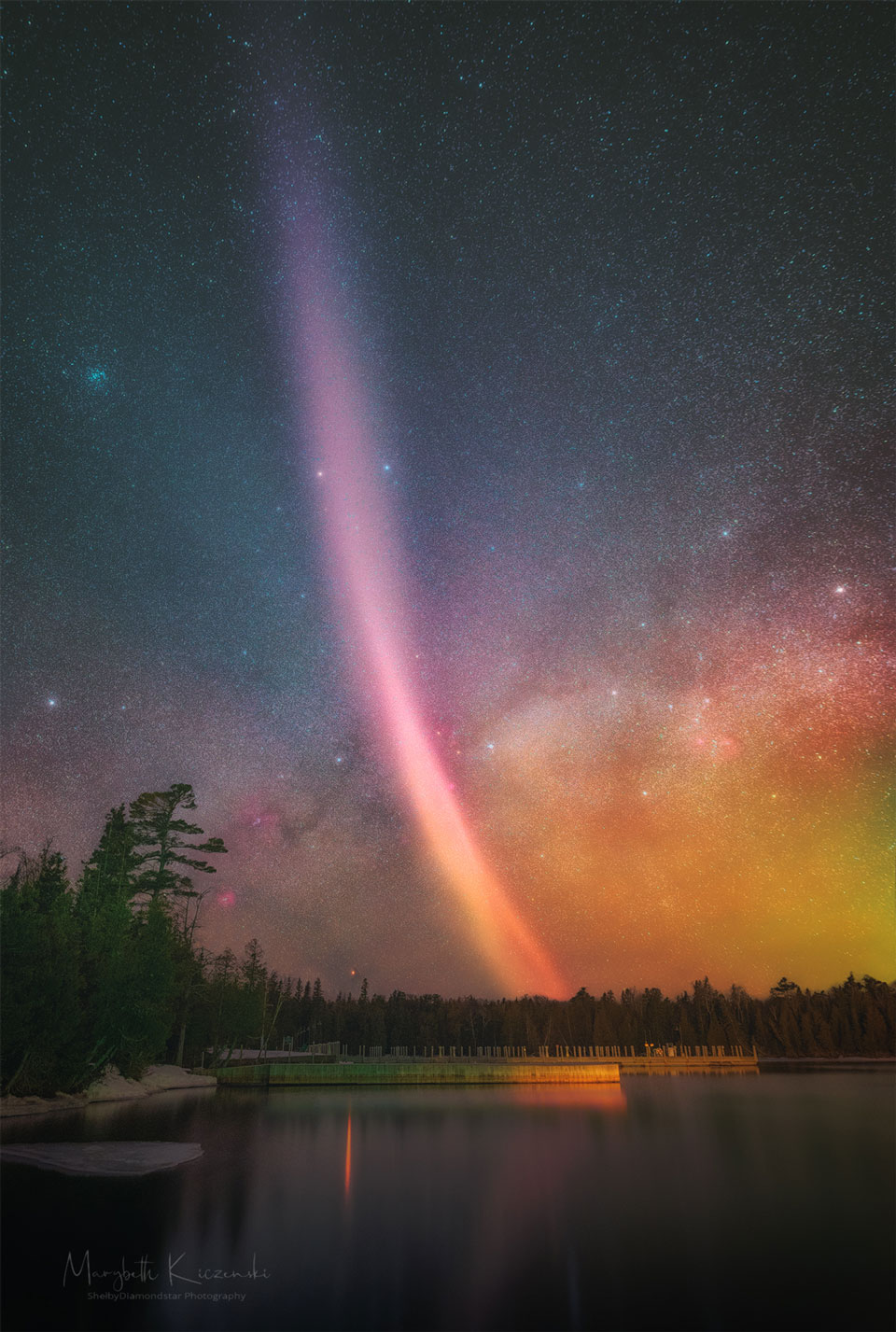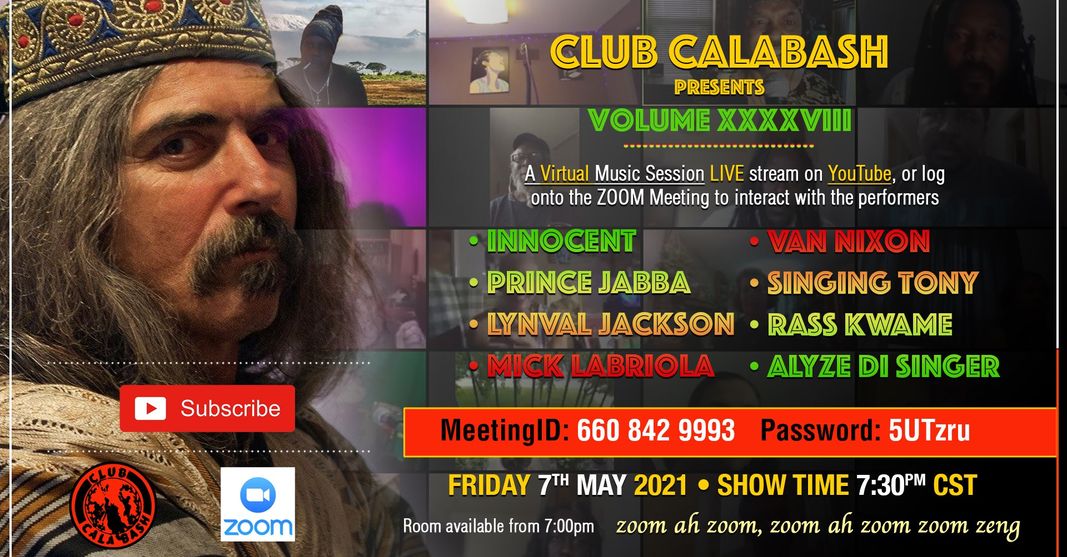Blog
NGC 3199 lies about 12,000 light-years away, a glowing cosmic cloud in the nautical southern constellation of Carina. The nebula is about 75 light-years across in this narrowband, false-color view. Though the deep image reveals a more or less complete bubble shape, it does look very lopsided with a much brighter edge along the top. Near the center is a Wolf-Rayet star, a massive, hot, short-lived star that generates an intense stellar wind. In fact, Wolf-Rayet stars are known to create nebulae with interesting shapes as their powerful winds sweep up surrounding interstellar material. In this case, the bright edge was thought to indicate abow shock produced as the star plowed through a uniform medium, like a boat through water. But measurements have shown the star is not really moving directly toward the bright edge. So a more likely explanation is that the material surrounding the star is not uniform, but clumped and denser near the bright edge of windblown NGC 3199.

David Friesen (born May 6, 1942 in Tacoma, Washington) is an American jazz bassist. He plays double bass and electric upright bass.
Friesen began playing bass while serving in the United States Army in Germany. He played with John Handy and Marian McPartland and following this, with Joe Henderson; in 1975, he toured in Europe with Billy Harper. His first album as a session leader appeared that year. In 1976, he began collaborating with guitarist John Stowell; the pair would work together often. He appeared with Ted Curson at the Monterey Jazz Festival in 1977. Following this, he worked with Ricky Ford, Duke Jordan, Mal Waldron, and Paul Horn. His 1989 album Other Times, Other Places reached No. 11 on the U.S. Billboard Top Jazz Albums chart. He has also played with Chick Corea, Michael Brecker, Stan Getz, Dexter Gordon, Kenny Garrett, Dizzy Gillespie, and Mal Waldron.
more...Leon Hughes, Sr. (born Leon Hughes, May 6, 1932 in Dallas, Texas, and raised in Los Angeles County, California) is an American singer. He is the last surviving original member of The Coasters.
Leon Hughes is an original member of The Coasters (Bobby Nunn, Carl Gardner, and Billy Guy). He recorded with the original group line-up until 1958. His tenor voice is heard on many of the group’s hits, including “Down in Mexico“, “Searchin“, and “Young Blood“. The group’s national debut happened in 1957, when the group appeared on NBC-TV’s The Tonight Show with host Steve Allen. Both of these hits were National Top 10 Hits and the Top R&B Hits of 1957. He also appeared on Dick Clark‘s popular new national show American Bandstand. He had been working at a car wash when Bobby Nunn had recommended him as second tenor for The Coasters. He was replaced after 1957 by Cornel Gunter. Leon’s career with the Original Coasters can be seen on the groups timeline at the Rock and Roll Hall of Fame Museum.
Leon’s career has given him opportunities to travel the world & to appear at many prominent venues. Some of them include the Famous Apollo Theatre, The Historic Howard Theatre, The Kennedy Center, Carnegie Hall, Madison Square Garden, Radio City Music Hall and Disneyland. He has appeared with legendary artists of the Rock and Roll Era. Some of these artists include: Chuck Berry, Little Richard, The Platters, The Drifters, Bill Haley and the Comets, The Shirelles and many more.
more...Hasaan Ibn Ali (born William Henry Langford, Jr.; May 6, 1931 – 1980) was an American jazz pianist and composer.
Ibn Ali was strongly influenced by Elmo Hope, and his playing was rapid and intense, retaining a sense of rhythm even when his style became increasingly unconventional. Only one recording of his playing – The Max Roach Trio Featuring the Legendary Hasaan – was released in his lifetime. Ibn Ali built a reputation in Philadelphia, where he influenced musicians including John Coltrane, but he remained little known elsewhere.
Hasaan Ibn Ali was born William Henry Langford, Jr. in Philadelphia on May 6, 1931. His mother was a domestic worker. In 1946 (aged 15), he toured with trumpeter Joe Morris‘s rhythm and blues band. In 1950, he played locally with Clifford Brown, Miles Davis, J. J. Johnson, Max Roach, and others. Based in Philadelphia, Ibn Ali freelanced and acquired a reputation locally as “an original composer and theorist”, in musicologist Lewis Porter‘s words. The pianist performed with Horace Arnold in New York City in 1959, and again in 1961–62, in a trio with Henry Grimes.
According to Roach, while visiting New York, Ibn Ali went from club to club to play, and sometimes at the drummer’s home in the middle of the night continued to play unaccompanied on the piano there. The drummer routinely recorded Ibn Ali’s playing in this way when the pianist visited. The Library of Congress has a 1964 recording of an Ibn Ali solo improvisation, recorded at Roach’s home. John Murph in JazzTimes described it in 2014: “Thoroughly modern with a whimsical rhythmic undertow and wayward melodic passages, it sounds like a new Jason Moran composition.
more...Cliff Carlisle (May 6, 1903 – April 5, 1983) was an American country and blues musician, singer and songwriter. Carlisle was a yodeler and was a pioneer in the use of the Hawaiian steel guitar in country music. He was a brother of country music star Bill Carlisle.
Carlisle was born in Taylorsville, Kentucky and began performing locally with cousin Lillian Truax at age 16. Truax’s marriage put an end to the group, and Carlisle began playing with Wilber Ball, a guitarist and tenor harmonizer. The two toured frequently around the U.S. playing vaudeville and circus venues in the 1920s.
Carlisle and Ball first played at Louisville, Kentucky radio station WHAS-AM in 1930, which made them local stars, and later that year they recorded for Gennett Records and Champion Records. In 1931, they recorded with Jimmie Rodgers. Toward the end of 1931, Carlisle signed with ARC and was offered performance slots on several radio stations, including WBT-AM in Charlotte, North Carolina, WLS-AM in Chicago and WLW-AM in Cincinnati, Ohio. Cliff’s brother Bill Carlisle became his guitarist after Ball left in 1934. During the 1930s Carlisle, who recorded a large amount of material despite a hiatus from 1934 to 1936, frequently released songs with sexual connotations including barnyard metaphors (which became something of a hallmark).
more...Amha Eshèté, a highly influential Ethiopian music producer and founder of Amha Records, died on April 30, 2021. The Amha Records label released iconic recordings of Ethiojazz and Ethiopop rooted in traditional music. These releases captured the golden era of Ethiopian music. The Amha recordings were licensed to French world music label Buda Musique and received worldwide distribution and critical acclaim as part of the successful Ethiopiques series.
more...Strong Thermal Emission Velocity Enhancements (STEVEs) have likely been seen since antiquity, but only in the past five years has it been realized that their colors and shapes make them different from auroras. Seen as single bright streaks of pink and purple, the origin of STEVEs remain an active topic of research. STEVEs may be related to subauroral ion drifts (SAIDs), a supersonic river of hot atmospheric ions. For reasons currently unknown, STEVEs are frequently accompanied by green “picket-fence” auroras. The featured STEVE image is a combination of foreground and background exposures taken consecutively in mid-March from Copper Harbor, Michigan, USA. This bright STEVE lasted several minutes, spanned from horizon to horizon, and appeared in between times of normal auroras.

more...
Stanley Cowell (May 5, 1941 – December 17, 2020) was an American jazz pianist and co-founder of the Strata-East Records label. Cowell was born in Toledo, Ohio. He began playing the piano around the age of four, and became interested in jazz after seeing Art Tatum at the age of six. Tatum was a family friend.
After high school, Cowell studied at Oberlin College and received a graduate degree in classical piano from the University of Michigan. During his time at college he played with jazz multi-instrumentalist Roland Kirk, which proved to be formative for the pianist. He moved to New York in the mid-1960s.
Cowell played with Marion Brown, Max Roach, Bobby Hutcherson, Clifford Jordan, Harold Land, Sonny Rollins and Stan Getz. Cowell played with trumpeter Charles Moore and others in the Detroit Artist’s Workshop Jazz Ensemble in 1965–66.
In 1971, Cowell founded the record label Strata-East together with trumpeter Charles Tolliver. The label would become one of the most successful Black-led, independent labels of all time.
During the late 1980s, Cowell was part of a regular quartet led by J.J. Johnson. Cowell taught in the Music Department of the Mason Gross School of the Arts at Rutgers University in New Jersey. On December 17, 2020, Cowell died at Bayhealth Hospital in Dover, Delaware, from hypovolemic shock. He was 79 years old.
https://www.youtube.com/watch?v=hEG2HHAVqPg
more...Edward “Kidd” Jordan (born May 5, 1935) is an American jazz saxophonist and music educator from New Orleans, Louisiana.
After completing a music degree at Southern University in Baton Rouge, he relocated to New Orleans. He taught at Southern University at New Orleans from 1974 to 2006.
Jordan was born in Crowley, Louisiana, and was raised during the time when rice farming was the predominant economic activity in the area. Jordan has noted that the music in southwestern Louisiana was “strictly Zydeco and Blues from way around, and that’s what I came up listening to.” Zydecomusician Clifton Chenier hailed from the same area, as did tenor saxophonist Illinois Jacquet (whose music teacher also instructed Jordan).
Jordan’s first instruments were C-melody and alto saxophones.[ While in high school, Jordan began performing “stock arrangements for three or four saxophones” with some older musicians, and immersed himself in the music of Charlie Parker. Jordan read transcribed solos in Down Beatmagazine but also learned Parker’s music by ear. He credits Illinois Jacquet with first giving him the idea of playing free improvisation, but was more profoundly affected by the free jazz of Ornette Coleman (who had previously performed in the area with blues bands).
Jordan majored in music education at Southern University, attending the school at the same time as Alvin Batiste (his brother-in-law). He originally planned to become a classical alto saxophonist. He moved to New Orleans in 1955, and began playing frequent R&B gigs with musicians such as Guitar Slim, Ray Charles, Big Maybelle, Big Joe Turner, Chuck Willis (with George Adams on baritone) and Choker Campbell. Jordan has described these gigs as being “satisfying for me, because there was a feeling that you’d get from dealing with that. I’ve played with some of the great female vocalists, from Gladys Knight to Aretha Franklin, or Big Maybelle, Little Esther, Lena Horne, and there’s an aesthetic in dealing with those people that a whole lot of people don’t get to. And the aesthetic from the Blues is a part of the thing that I want to have in my playing. I don’t care how out it gets.”
Jordan performs on tenor, baritone, soprano, alto, C-melody and sopranino saxophones, as well as contrabass and bass clarinets. He has indicated a preference for playing “outside” music (for example, free improvisation) on tenor, because he closely associates the alto with his earlier study of classical repertoire, tone, and technique.[3] Jordan has performed and recorded with a wide selection of musicians in styles ranging from R&B to avant-garde jazz, including Ray Charles, Stevie Wonder, R.E.M., William Parker, Alvin Fielder, Archie Shepp, Fred Anderson, Ornette Coleman, Ellis Marsalis, Cannonball Adderley, Ed Blackwell, and Cecil Taylor. In 2008, he was awarded a lifetime recognition honor by the Vision Festival.
more...Blind Willie McTell (born William Samuel McTier; May 5, 1898 – August 19, 1959) was a Piedmont blues and ragtime singer and guitarist. He played with a fluid, syncopated fingerstyle guitar technique, common among many exponents of Piedmont blues. Unlike his contemporaries, he came to use twelve-string guitarsexclusively. McTell was also an adept slide guitarist, unusual among ragtime bluesmen. His vocal style, a smooth and often laid-back tenor, differed greatly from many of the harsher voices of Delta bluesmen such as Charley Patton. McTell performed in various musical styles, including blues, ragtime, religious music and hokum.
McTell was born in Thomson, Georgia. He learned to play the guitar in his early teens. He soon became a street performer in several Georgia cities, including Atlanta and Augusta, and first recorded in 1927 for Victor Records. He never produced a major hit record, but he had a prolific recording career with different labels and under different names in the 1920s and 1930s. In 1940, he was recorded by the folklorist John A. Lomax and Ruby Terrill Lomax for the folk song archive of the Library of Congress. He was active in the 1940s and 1950s, playing on the streets of Atlanta, often with his longtime associate Curley Weaver. Twice more he recorded professionally. His last recordings originated during an impromptu session recorded by an Atlanta record store owner in 1956. McTell died three years later, having suffered for years from diabetes and alcoholism. Despite his lack of commercial success, he was one of the few blues musicians of his generation who continued to actively play and record during the 1940s and 1950s. He did not live to see the American folk music revival, in which many other bluesmen were “rediscovered”.
McTell’s influence extended over a wide variety of artists, including the Allman Brothers Band, who covered his “Statesboro Blues“, and Bob Dylan, who paid tribute to him in his 1983 song “Blind Willie McTell“, the refrain of which is “And I know no one can sing the blues like Blind Willie McTell”. Other artists influenced by McTell include Taj Mahal, Alvin Youngblood Hart, Ralph McTell, Chris Smither, Jack White, and the White Stripes.
more...John Dee Holeman, one of the leading performers of Piedmont blues, died on April 30, 2021 in Roxboro, North Carolina.
Guitarist, singer-songwriter and dancer John Dee Holeman was born on April 4, 1929 in Hillsborough, North Carolina and lived for many years in Durham, North Carolina.
During his early years, Holeman played at local parties and other events. Later, he moved to Durham and started playing electric guitar with pianist Fris Holloway. Both artists became well known for doing the Juba dance (complex hand rhythms that accompany dancers).
more...
The Fox Fur Nebula is a nebula (a formation of gas and dust) located in the constellation of Monoceros (the Unicorn) not far off the right arm of Orion and included in the NGC 2264 Region. In the Sharpless catalog it is number 273. The image is a close-up of a small section of a much larger complex, generally known as the Christmas Tree cluster. The Cone Nebula is also a part of this same cloud. The red regions of this nebula are caused by hydrogen gas that has been stimulated to emit its own light by the copious ultraviolet radiation coming from the hot, blue stars of the cluster. The blue areas shine by a different process: they are mainly dust clouds that reflect the bluish light of the same stars. Its popular name arises because the nebula looks like the head of a stole made from the fur of a red fox.

Ronald Levin Carter (born May 4, 1937) is an American jazz double bassist. His appearances on 2,221 recording sessions make him the most-recorded jazz bassist in history. Carter has two Grammy awards. Carter is also a cellist who has recorded numerous times on that instrument. Some of his studio albums as a leader include: Blues Farm (1973); All Blues (1973); Spanish Blue (1974); Anything Goes (1975); Yellow & Green(1976); Pastels (1976); Piccolo (1977); Third Plane (1977); Peg Leg (1978); A Song for You (1978); Etudes (1982); The Golden Striker (2003); Dear Miles (2006); Ron Carter’s Great Big Band (2011).
Carter was born in Ferndale, Michigan. He started to play cello at the age of 10, and switched to bass while in high school. He earned a B.A. in music from the Eastman School of Music (1959) and a master’s degree in music from the Manhattan School of Music (1961).
Carter’s first jobs as a jazz musician were playing bass with Chico Hamilton in 1959, followed by free-lance work with Jaki Byard, Cannonball Adderley, Randy Weston, Bobby Timmons, and Thelonious Monk. One of his first recorded appearances was on Hamilton alumnus Eric Dolphy‘s Out There, recorded on August 15, 1960, and featuring George Duvivier on bass, Roy Haynes on drums, and Carter on cello. The album’s advanced harmonies and concepts were in step with the third stream movement. In early October 1960, Carter recorded How Time Passes with Don Ellis, and on June 20, 1961, he recorded Where?, his first album as a leader, featuring Dolphy on alto sax, flute, and bass clarinet, Mal Waldron on piano, Charlie Persip on drums, and Duvivier playing bass lines on tracks where Carter played cello.
https://www.youtube.com/watch?v=asJRAGUlZ1c
more...Walter Maynard Ferguson CM (May 4, 1928 – August 23, 2006) was a Canadian jazz trumpeter and bandleader. He came to prominence in Stan Kenton‘s orchestra before forming his own big band in 1957. He was noted for his bands, which often served as stepping stones for up-and-coming talent, his versatility on several instruments, and his ability to play in a high register. Ferguson was born in Verdun (now part of Montreal), Quebec. Encouraged by his mother and father (both musicians), he started playing piano and violin at the age of four. At nine years old, he heard a cornet for the first time in his local church and asked his parents to buy one for him. When he was thirteen, he soloed with the Canadian Broadcasting Corporation Orchestra. He was heard frequently on the CBC, notably featured on a “Serenade for Trumpet in Jazz” written for him by Morris Davis. He won a scholarship to the Conservatoire de musique du Québec à Montréal where he studied from 1943 to 1948 with Bernard Baker.
more...Umm Kulthum (Arabic: أم كلثوم, Egyptian Arabic: [ˈomme kælˈsuːm]; French: Oum Kalthoum; born Fāṭima ʾIbrāhīm es-Sayyid el-Beltāǧī فاطمة إبراهيم السيد البلتاجي on 31 December 1898, or 4 May 1904; died 3 February 1975) was an Egyptian singer, songwriter, and film actress active from the 1920s to the 1970s. She was given the honorific title Kawkab al-Sharq (كوكب الشرق, ‘Star of the East’). Umm Kulthum was known for her vocal ability and unique style. She sold over 80 million records worldwide, making her one of best-selling singers of all time from the Arab world.
She is considered a national icon in her native Egypt; she has been dubbed “The voice of Egypt” and “Egypt’s fourth pyramid”.
more...More Posts
- Alpha Blondy Day
- Omar Hakim Day
- Milt Jackson Day
- World Music with Ulla Pirttijärvi
- Daily Roots with Chronixx, Jah Cure, Morgan Heritage, Chris Martin
- Happy New Year 2020
- The Cosmos with M33
- John Denver Day
- John Kirby Day
- Odetta Day
- Jonah Jones Day
- World Music with Huun-Huur-Tu
- Daily Roots with Tsunami Wazahari
- The Cosmos with M20/21
- Del Shannon Day
- John Hartford Day
- Bo Diddley Day
- Jimmy Jones Day
- World Music with Ayarkhaan
- Daily Roots with Radikal Guru
